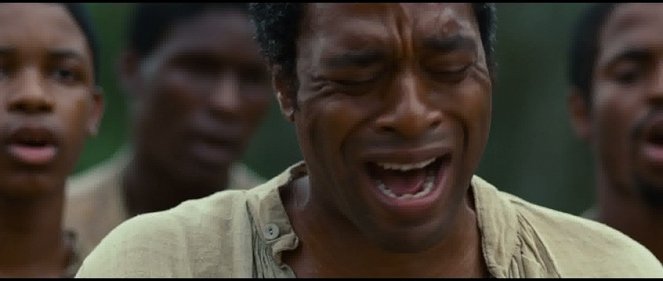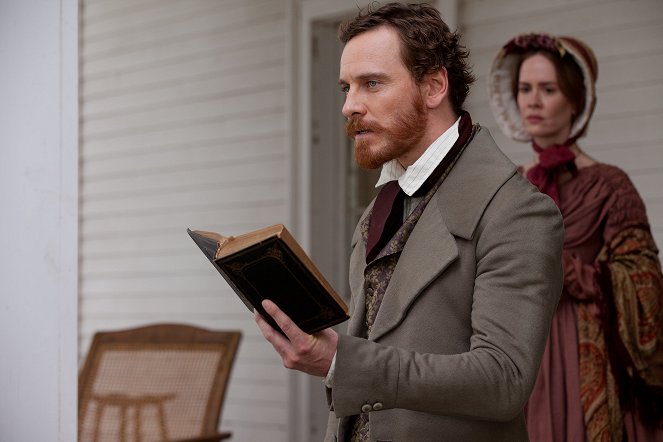Directed by:
Steve McQueenScreenplay:
John RidleyCinematography:
Sean BobbittComposer:
Hans ZimmerCast:
Chiwetel Ejiofor, Michael Fassbender, Lupita Nyong'o, Benedict Cumberbatch, Sarah Paulson, Paul Dano, Brad Pitt, Paul Giamatti, Michael Kenneth Williams (more)VOD (2)
Plots(1)
In the pre-Civil War United States, Solomon Northup (Chiwetel Ejiofor), a free black man from upstate New York, is abducted and sold into slavery. Facing cruelty as well as unexpected kindnesses, Solomon struggles not only to stay alive, but to retain his dignity. In the twelfth year of his unforgettable odyssey, Solomon's chance meeting with a Canadian abolitionist (Brad Pitt) forever alters his life. 12 Years A Slave is based on an incredible true story of one man's fight for survival and freedom. (Entertainment One)
(more)Videos (36)
Reviews (16)
Just like Zimmer recycles his music, McQueen here has recycled all of the movies about black slaves that have existed to this day. Honestly, this film has nothing unexpected or otherwise interesting. Ejiofor becomes a slave, is a slave for twelve years and then it’s no longer a slave. The end. I also had some problem with the time frame, it didn’t feel at all like it was twelve years, I actually felt that the story could’ve taken place in four years, or even less. But the execution is very good, without any excessive moralising or pathetic bullshit, so a pretty decent Oscar winner. BTW, the best performance is Fassbender’s, hands down, while Pitt surprisingly manages to annoy even in his short, almost cameo appearance.
()
A drama with two storylines, an omniscient narrator and clearly defined objective and solidly cohesive dramaturgy? Dialogue handled predominantly with the shot/countershot technique? Softening of violent moments though precise editing? Not this time. Though 12 Years a Slave has been reproached for its conservative classicism, what McQueen adopts from the classic Hollywood style is especially an interest in the human body, which could also be described as an expression of his creative signature. Faithfulness to the original book even at the cost of breaking up the narrative into a number of episodes that are not firmly interconnected, and when one isn’t conditioned by another, was one of the many wise filmmaking choices that resulted in a lacerating cinematic account of the atrocities that whites perpetrated against a race that they considered to be inferior. McQueen’s mastery consists in the way he manages to avoid twisting historical facts in order for them to fit into the bigger story (like Spielberg in Amistad and Lincoln), while providing an extremely intense viewing experience. Thanks to the suppression of dramatic tension and the numerous static shots, the film seems like a series of consecutively arranged images that slowly burrow into the viewer’s memory thanks to the spiral repetition of certain situations and shot compositions. True to his background as a video artist, McQueen does not recount history or turn it into a drama, but instead lets it come alive as if it were happening right now. The protagonist’s hardships are therefore not viewed from the outside. We experience them together with Solomon, through his body, eyes and ears. Throughout the film, we know just as little as he does (for example, we never see the whole ship by which he is transported to New Orleans) and, despite the telling title of the film, we have just as few reasons to believe that he can emerge victorious from the uneven struggle for his own identity. The reduction of life to mere survival and the transformation of a person into an animal (or rather property) are highlighted by the loss of consciousness of spatial and temporal contexts, as we are not informed about the time and place of the events, with the exception of the introduction. In combination with the complete lack of moments providing relief, the abundance of unpleasant shots and images, from which the camera never turns away (the unpleasant shots are also the longest) makes 12 Years a Slave one of the most audacious films of last year. 90%
()
The film is shot decently, with exceptional care, and it can be seen that if not the director himself, then the producer was definitely counting on a festival award - after all, the subject matter is the sort where the creators claim a film award in advance. However, my 4 stars are rather meant as my appreciation of the formal qualities rather than an expression of emotional solidarity with the film. It has a strong story and theme, and yet I watched a film that didn't touch me emotionally in any way, and what's more, it didn't surprise me at all. It has exactly what one would expect, and while Hunger from the workshop of Steve McQueen, which is rated worse on FilmBooster, got under my skin and made me think about the film and come back to it in memories, in the case of 12 Years a Slave, I feel like I just ticked off having seen it. Overall impression: 70%. Sometimes the term film academism appears in film comments - I would say that it fits quite well with this film.
()
I took the time to read a little more about the whole Solomon Northup thing. Right up to the moment when he is freed from slavery, it is a wonderful account of the American South before the Civil War. But why does the film end here? Because what happened later and how much information there is about it would not be as clear. It is no coincidence, after all, that the memoirs helped Northup write and publish it just a year after "Uncle Tom's Cabin" was published. None of those involved in his abduction were punished. Northup himself disappears very soon after a brief tour to promote his cause and book. Given the kind of manifesto the film version of 12 Years a Slave was meant to be, it raises more questions, and it's not just about the pious parallel with today. Why all the acting orgies by Fassbender, Paulson, or Pitt? Nyong'o is only acting in the MCU these days anyway, so I'm not really feeling all that good about it.
()
Django turned upside down. An odyssey into the emotional and mental state that results from the loss of dignity and absolute humiliation, quietly conveyed in wide-angle shots of marshy Louisiana with music by Hans Zimmer that is reminiscent of his score for The Thin Red Line (Williams’s strings would have worked better here). The unimaginative but “safe” Hollywood narrative template keeps the film unnecessarily tame and moves it away from the original character we had hoped for from the film’s director, Steve McQueen. He made a huge mistake by casting the likeable Fassbender in the key and most complex role of the sadistic, evil and weak Epps. Even Benedict Cumberbatch would have been a better fit for this paraphrase of the character of Amon Goeth (Ralph Fiennes) from Schindler’s List and, with a more believable embodiment of ultimate human evil, the last third of the film escalating in the final flogging could have been the most powerful movie moment of the year.
()



Ads